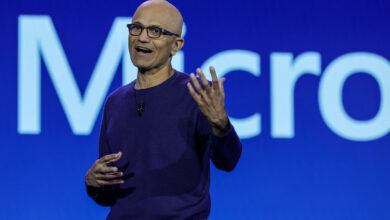2 Things Snowflake Investors Need to Know About CEO Frank Slootman’s Surprise Resignation


Snowflake (NYSE: SNOW) is one of the most closely followed software companies in the market. The company competes with the likes of Amazon Redshift, Google BigQuery, Oracle Database, and unicorn start-up Databricks.
Snowflake became a household name for technology investors following its record IPO back in 2020. A little more than a year prior to its public market debut, Snowflake appointed Silicon Valley legend Frank Slootman as its CEO.
While Slootman is largely credited with Snowflake’s success since going public, investors were hit with some shocking news following the release of the company’s fourth-quarter earnings report.
Slootman is stepping down as CEO of Snowflake, effective immediately. While he will remain Chairman of the Board, investors don’t appear too thrilled. Let’s dig into this surprising development and assess how it could impact investors.
1. Slootman is a technology legend, but…
Co-founders are one of the hallmarks of famous technology companies. Microsoft was led by its founder, Bill Gates, for several years before he handed the keys to Steve Ballmer in 2000. Similarly, Larry Page, who co-founded Alphabet (then called Google), has had multiple stints in the CEO position.
While Slootman has earned an exceptional reputation as a tech executive, he does not have the same experience as some of his cohorts. Slootman has spent a good portion of his career in the C-Suite, but not necessarily as an actual product builder or founder.
Before joining Snowflake, Slootman served as CEO of information technology (IT) data company ServiceNow, and prior to that, he was CEO of Data Domain (which is now part of Dell Technologies).
According to company press releases, Slootman’s successor will be Sridhar Ramaswamy, who recently served as the Senior Vice President of AI at Snowflake. Ramaswamy joined Snowflake last year, as part of the company’s acquisition of AI start-up Neeva, which he co-founded. Ramaswamy’s experience as a co-founder (although not of Snowflake exactly) could bring something to the table that Slootman didn’t as the company looks to move into its next phase of growth beyond data warehousing.
Although Ramaswamy boasts an impressive resume of his own, investors seem less than enthusiastic about the transition at the moment. As of now, Snowflake stock is down over 20% after hours following the announcement of Slootman’s resignation. However, this transition seems to signal the company’s focus on leveraging artificial intelligence (AI) in its business going forward.
2. What’s next for Snowflake?
Snowflake has its eyes on the AI market like many of its peers. Big data analytics peers, including Palantir, Microsoft, and others, have all showcased how demand for artificial intelligence AI applications is fueling a new wave of growth.
For the 12 months ended Jan. 31, Snowflake reported total revenue of $2.8 billion — an increase of 33% year over year. The company’s software services increased 38% in 2023, reaching $2.7 billion. On top of that, the company ended the year with $5.2 billion in remaining performance obligations (RPO) and expects to recognize half of that as revenue within the next year.
The glaring issue that I see in Snowflake’s business is its net revenue retention rate (NRR). This is a ratio that measures how much revenue a company retains net of any churn that it experiences. If the ratio is above 100%, this implies that the company is outselling its churn. Snowflake’s NRR is 131%; however, it has actually declined in seven straight quarters.
While Slootman seems to be departing at a time when Snowflake needs some help maintaining its revenue base, there are some silver linings.
First, research firm Gartner is projecting that worldwide tech spend will reach $6.5 trillion by 2027. Among this budget, IT and software services are expected to be the largest cohorts. This should serve as a bellwether for companies like Snowflake.
Moreover, as artificial intelligence becomes more prominent in tech stocks, I see it as highly likely that spending on cloud-based products will witness unprecedented acceleration over the next several years.
I think Snowflake has a greenfield opportunity to benefit from the secular tailwinds pushing the AI market. However, the big question revolves around Ramaswamy and his ability to execute.
For now, I think investors are best suited on the sidelines and should assess Snowflake’s progress in a post-Slootman world in the coming quarters. If the company is able to capture a meaningful share of the AI market, investors will have ample opportunity to buy the stock and enjoy long-term returns.
Should you invest $1,000 in Snowflake right now?
Before you buy stock in Snowflake, consider this:
The Motley Fool Stock Advisor analyst team just identified what they believe are the 10 best stocks for investors to buy now… and Snowflake wasn’t one of them. The 10 stocks that made the cut could produce monster returns in the coming years.
Stock Advisor provides investors with an easy-to-follow blueprint for success, including guidance on building a portfolio, regular updates from analysts, and two new stock picks each month. The Stock Advisor service has more than tripled the return of S&P 500 since 2002*.
*Stock Advisor returns as of February 26, 2024
Suzanne Frey, an executive at Alphabet, is a member of The Motley Fool’s board of directors. John Mackey, former CEO of Whole Foods Market, an Amazon subsidiary, is a member of The Motley Fool’s board of directors. Adam Spatacco has positions in Alphabet, Amazon, Microsoft, and Palantir Technologies. The Motley Fool has positions in and recommends Alphabet, Amazon, Microsoft, Oracle, Palantir Technologies, ServiceNow, and Snowflake. The Motley Fool recommends Gartner and recommends the following options: long January 2026 $395 calls on Microsoft and short January 2026 $405 calls on Microsoft. The Motley Fool has a disclosure policy.
2 Things Snowflake Investors Need to Know About CEO Frank Slootman’s Surprise Resignation was originally published by The Motley Fool
Source link




